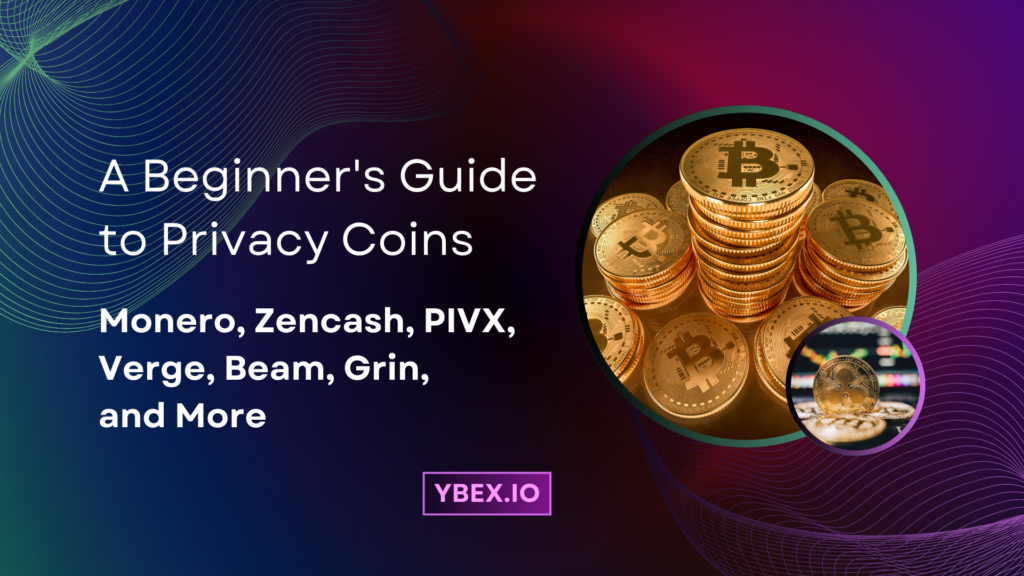A Beginner’s Guide to Privacy Coins: Monero, Zencash, PIVX, Verge, Beam, Grin, and More
In today’s digital age, privacy is more important than ever, especially in the world of cryptocurrency. With increasing concerns over surveillance, data breaches, and financial tracking, privacy coins have emerged as a vital tool for those who value anonymity and security. This beginner’s guide will introduce you to privacy coins – what they are, how they work, and why they matter. We’ll take a close look at some of the most popular privacy coins, including Monero, Zencash (now Horizen), PIVX, Verge, Beam, Grin, and Firo – and explore the potential benefits and risks associated with using them.
What Are Privacy Coins?
Privacy coins are a category of cryptocurrencies specifically designed to provide enhanced privacy and anonymity for users. Unlike traditional cryptocurrencies such as Bitcoin, where transactions are recorded on a public ledger and can potentially be traced, privacy coins use advanced cryptographic techniques to obfuscate transaction data. This means that the sender, receiver, and transaction amount remain hidden from public view.
The primary goal of privacy coins is to offer financial freedom and protect user identity in an increasingly monitored digital world. They have become particularly popular among users who are concerned about government surveillance, hackers, or simply wish to keep their financial activities confidential.
How Do Privacy Coins Work?
Privacy coins employ a variety of technologies to ensure anonymity and security. Some of the most common techniques include:
Ring Signatures
Used by Monero (XMR), ring signatures allow a transaction to be signed by any member of a group of users, making it extremely difficult to pinpoint the true sender. This method mixes the spender’s transaction with a group of others, thereby obscuring the source of funds.
Stealth Addresses
Stealth addresses are used to create one-time addresses for each transaction. This means that even if a sender and receiver are known, it is nearly impossible to trace the transactions back to them.
Zero-Knowledge Proofs
Some privacy coins, such as Zcash (though not mentioned initially, it’s worth noting as a key privacy coin), utilize zero-knowledge proofs (zk-SNARKs) to verify transactions without revealing any information about the sender, receiver, or amount transacted.
Mimblewimble Protocol
Privacy coins like Beam and Grin implement the Mimblewimble protocol. This innovative design combines transactions in a way that makes it impossible to determine individual transaction details while still allowing for verification of overall network activity.
Proof-of-Stake and Other Variations
Coins such as PIVX use a combination of proof-of-stake (PoS) mechanisms and privacy features. This allows for energy-efficient transactions while ensuring that privacy remains intact through advanced obfuscation techniques.
Overview of Leading Privacy Coins
Let’s explore some of the most popular privacy coins that are currently shaping the crypto landscape:
Monero (XMR)
Monero is the most well-known privacy coin, celebrated for its robust privacy features. It uses ring signatures, stealth addresses, and confidential transactions to ensure that every transaction is completely anonymous. Monero’s focus on privacy has made it a favorite among users who require high levels of security. Additionally, its active development community continuously improves its protocol, making it one of the most reliable privacy coins available.
Zencash (Now Horizen – ZEN)
Originally known as Zencash, Horizen has evolved into a privacy-centric blockchain platform that not only offers privacy for transactions but also supports decentralized applications. Horizen employs advanced cryptographic techniques to secure user data and maintain transaction privacy. Its dual focus on privacy and scalability positions it as a versatile solution for both individual and institutional investors.
PIVX (Private Instant Verified Transaction)
PIVX is another prominent privacy coin that emphasizes both privacy and energy efficiency. Using a proof-of-stake (PoS) consensus mechanism, PIVX offers faster transactions and lower fees compared to proof-of-work (PoW) systems. Its implementation of privacy features, including advanced obfuscation methods, makes it a strong contender in the privacy coin market.
Verge (XVG)
Verge aims to offer fast, anonymous transactions by integrating several anonymity-centric networks like Tor and I2P. Although Verge has faced its share of controversies and security issues in the past, it continues to evolve and remains popular due to its commitment to user privacy and fast transaction speeds.
Beam and Grin
Both Beam and Grin are built on the Mimblewimble protocol, which is known for its simplicity and scalability while maintaining strong privacy features. These coins offer a unique approach to anonymity by aggregating transactions in a way that makes it nearly impossible to trace individual transfers. Beam and Grin have garnered attention for their innovative design and potential for widespread adoption in privacy-focused applications.
Firo (formerly Zcoin)
Firo, previously known as Zcoin, focuses on true anonymity through a protocol called Lelantus, which allows users to burn coins to obfuscate transaction history. Firo aims to strike a balance between privacy and regulatory compliance, making it an attractive option for users who seek enhanced privacy without completely distancing themselves from mainstream financial systems.
Benefits and Risks of Privacy Coins
Benefits
- Enhanced Anonymity: The primary benefit of privacy coins is their ability to provide complete anonymity, which is crucial for users concerned about surveillance or unwanted tracking.
- Security: Privacy coins use sophisticated cryptographic techniques that enhance the security of transactions, reducing the risk of hacking and fraudulent activities.
- Financial Freedom: By ensuring that transaction details remain private, these coins support the concept of financial sovereignty, allowing individuals to transact without fear of external interference.
- Decentralization: Many privacy coins operate on decentralized networks, reducing the reliance on centralized authorities and promoting a more resilient financial system.
Risks
- Regulatory Challenges: Privacy coins often face intense regulatory scrutiny due to concerns about their potential misuse in illicit activities. Governments worldwide are beginning to impose stricter regulations, which could impact their adoption.
- Market Volatility: Like all cryptocurrencies, privacy coins are subject to high volatility. While their unique features may attract investors, price swings can be significant.
- Security Vulnerabilities: Despite robust security measures, some privacy coins have experienced technical glitches or security breaches. Investors must remain vigilant and ensure they use reliable wallets and platforms.
- Limited Adoption: Although privacy coins offer substantial benefits, mainstream adoption remains a challenge, partly due to regulatory uncertainty and negative perceptions related to illegal activities.
Trading and Investing in Privacy Coins
Investing in privacy coins can be an important part of a diversified crypto portfolio, especially if you value enhanced privacy and security. Here are some tips for trading and investing in privacy coins:
- Use Reputable Exchanges: Look for cryptocurrency exchanges that prioritize security and have a proven track record with privacy coins. Popular exchanges like Binance, Kraken, and specialized privacy-focused platforms offer support for many of these coins.
- Stay Informed: Follow industry news, join community forums, and subscribe to newsletters to keep up with the latest developments in privacy coin technology and regulations.
- Risk Management: Due to their volatility and regulatory risks, it’s essential to use proper risk management strategies. This includes setting stop-loss orders and only investing what you can afford to lose.
- Diversify: Don’t put all your eggs in one basket. While privacy coins offer unique benefits, diversify your portfolio with other types of cryptocurrencies and digital assets to mitigate risks.
Conclusion
Privacy coins represent a vital evolution in the cryptocurrency space, offering enhanced anonymity, security, and financial freedom. Whether you are interested in Monero, Horizen, PIVX, Verge, Beam, Grin, or Firo, understanding the benefits and risks associated with these tokens is crucial for making informed investment decisions.

